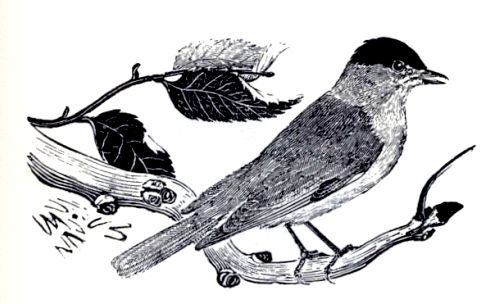May 19
Posted by sydney on May 19th, 2009

Blackcap by T. Bewick. Song of the blackcap, courtesy of Inchadney at Freesound:
- 1793: May 19, 1793 – The white apple-tree shows again, as usual, much bloom.
- 1792: May 19, 1792 – The middle Bantam brought forth nine chickens.
- 1789: May 19, 1789 – Stellaria holostea greater stichwort, blows: a regular, periodical plant.
- 1786: May 19, 1786 – Mrs Yalden came. Many pairs of daws build in the church: but they have placed their nests so high up between the shingles, & the ceiling, that ye boys cannot come at them. These birds go forth to feed at 1/2 hours after four in the morning.
- 1785: May 19, 1785 – Planted some red cabbages from S. Lambeth. Planted some green cucumber-plants to fill the void spaces in the early-frames.
- 1784: May 19, 1784 – Flowers fade, & go-off very fast thro’ heat. There has been only one moderate shower all this month. Bees thrive. Asparagus abounds.
- 1780: May 19, 1780 – Helleborus viridis sheds it’s seeds in my garden, & produces many young plants.
- 1778: May 19, 1778 – Blowing & cold. In such weather as this the swifts seldom appear. Bees suffer, & get weak.
- 1777: May 19, 1777 – Swallows begin to collect dirt from the road, & to carry it into chimneys for the business of nidification.
- 1775: May 19, 1775 – No chafers appear as yet: in those seasons that they abound they deface the foliage of the whole country, especially on the downs, where woods & hedges are scarce. Regulus non cristatus stridet voce locustulae: this bird, the latest & largest willow-wren, haunts the tops of the tallest woods, making a stammering noise at intervals, & shivering with it’s wings. Bank-martins abound over the ponds in the forest: swifts seldom appear in cold, black days round the church.
- 1774: May 19, 1774 – The first leaves of the peaches & nect: sadly blotched, & rivelled. These leaves seem not to be affected by animals; but are monstrously distorted. Mem: to observe whether the peaches & nect. whose leaves are so blotched, can bear any well-flavoured fruit. [later note:] They bore fine fruit in plenty, considering the wet shady season.
- 1770: May 19, 1770 – Black-cap sings sweetly, but rather inwardly: it is a songster of the first rate. It’s notes are deep & sweet. Called in Norfolk the mock nightingale.
- 1768: May 19, 1768 – Rudiments of wasps’ nests are found. No chaffers, or tree beetles, appear yet. The wasps’ nest contained eleven eggs in eleven cells.

 Theme Ported to
Theme Ported to